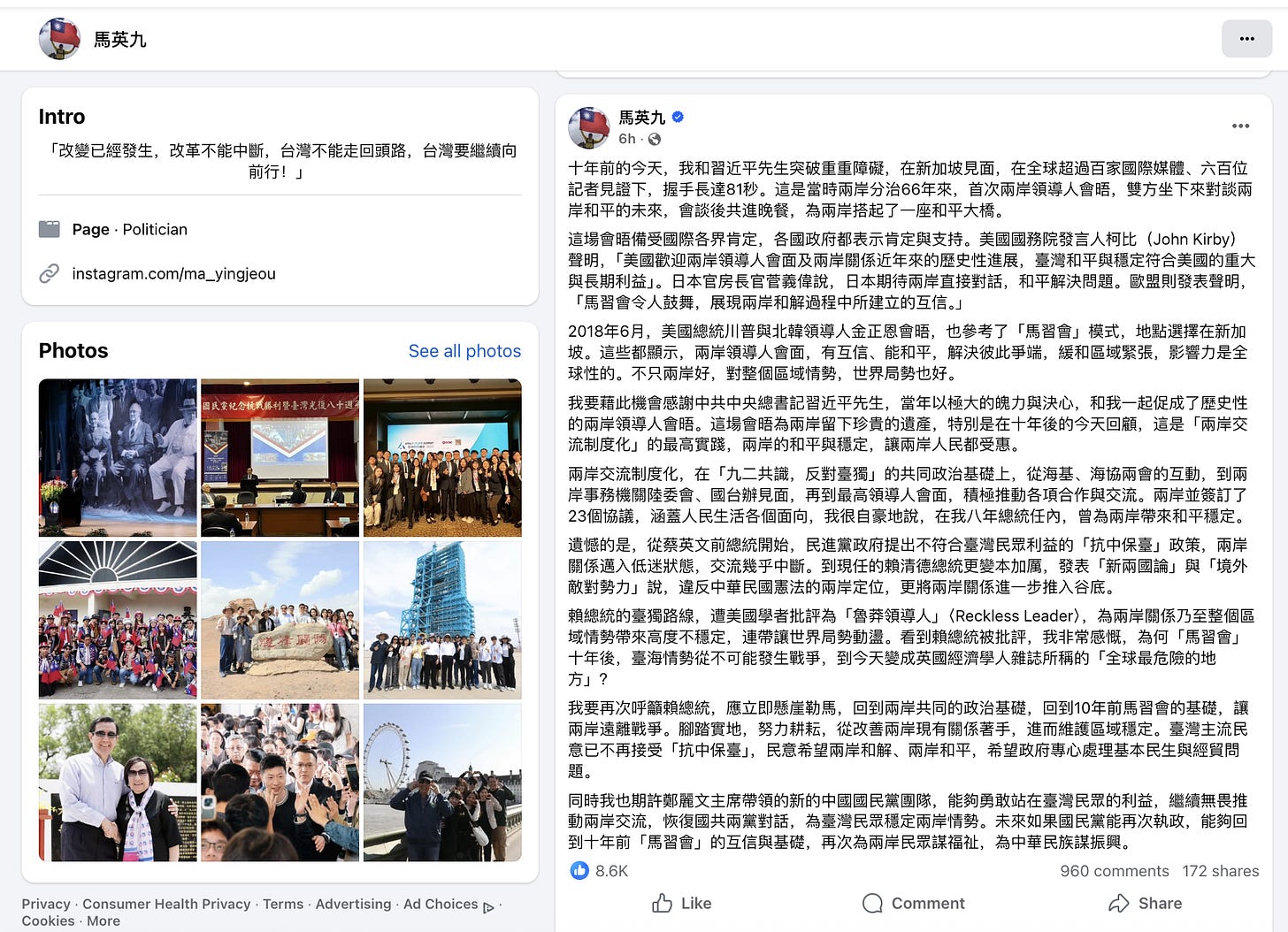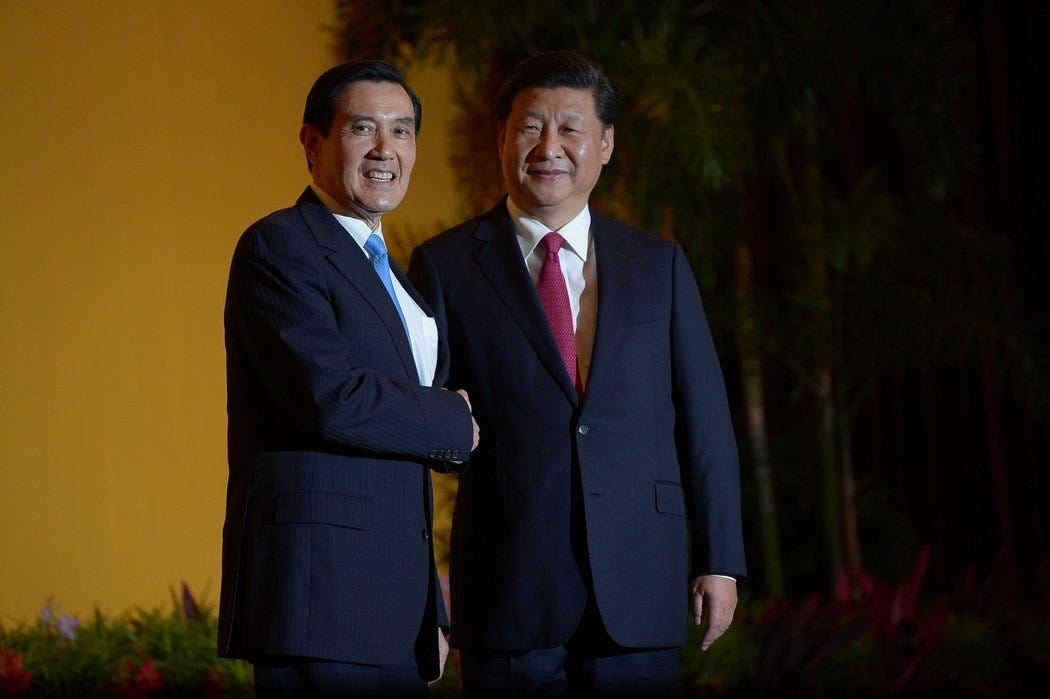Ma Ying-jeou remembers historic meeting with Xi Jinping a decade ago
Taiwan’s former leader laments the slide from cross-Strait peace and stability to “the most dangerous place on earth,” urges corrections.
On November 7, 2015—exactly ten years ago today—Ma Ying-jeou, then Taiwan’s leader and head of the Kuomintang (now in opposition), met in Singapore and shook hands with Xi Jinping, General Secretary of the Communist Party of China
In his Chinese-language account on Meta, Ma wrote today
Ten years ago today, Mr. Xi Jinping and I overcame numerous obstacles to meet in Singapore. In front of more than one hundred international media outlets and six hundred journalists worldwide, we shook hands for 81 seconds. It was the first meeting between leaders of the two sides across the Taiwan Strait in the 66 years since the division of governance. We sat down to discuss the future of cross-Strait peace, and after the talks we shared a dinner, building a bridge of peace across the Strait.
The meeting was met with strong recognition from the international community. Governments around the world expressed approval and support. U.S. Department of State spokesperson John Kirby said, “The US welcomes the meeting between leaders on both sides of the Taiwan Strait and the historic improvement in cross-Strait relations in recent years. The US has a deep and abiding interest in peace and stability in the Taiwan Strait.” Japan’s Chief Cabinet Secretary Yoshihide Suga said “Japan hopes that the issues concerning Taiwan are solved peacefully through direct dialogue between the parties.” The European Union issued a statement saying the Ma-Xi meeting “is an encouraging step, demonstrating the level of trust that has been built through the ongoing process of rapprochement.”
In June 2018, the summit between U.S. President Donald Trump and North Korean leader Kim Jong-un drew on the “Ma-Xi meeting” model, including choosing Singapore as the venue. All of this shows that when leaders on both sides of the Strait meet with mutual trust and a willingness for peace, disputes can be resolved, tensions in the region can be eased, and the impact is global. It benefits not only both sides, but also the regional and even world situation.
I want to take this opportunity to thank Mr. Xi Jinping, General Secretary of the Communist Party of China (CPC) Central Committee, who, with great determination and resolve, worked with me to realize this historic meeting between cross-Strait leaders. The meeting left a precious legacy for both sides. Especially looking back ten years later, it was the highest practice of “institutionalized cross-Strait exchanges.” The peace and stability across the Strait allowed people on both sides to benefit.
Institutionalized cross-Strait exchanges were built on the common political foundation of the “1992 Consensus” and opposition to Taiwan independence. From interactions between Straits Exchange Foundation and Association for Relations Across the Taiwan Strait, to meetings between Taiwan’s Mainland Affairs Council and the People’s Republic of China’s Taiwan Affairs Office, and ultimately the meeting between top leaders, both sides actively advanced cooperation and exchanges. The two sides signed 23 agreements covering all aspects of people’s daily lives. I am proud to say that during my eight years as President, we were able to bring peace and stability to cross-Strait relations.
Unfortunately, under former President Tsai Ing-wen, the Democratic Progressive Paarty government introduced the so-called 抗中保台 “Resist China, Protect Taiwan” policy, which does not serve the interests of the people of Taiwan. Cross-Strait relations entered a period of stagnation, and exchanges were nearly cut off. The current President, Lai Ching-te, has gone even further, promoting the “new two-state theory” and “hostile external forces” rhetorics, violating the constitutional definition of cross-Strait relations under the Constitution of the Republic of China, and pushing the relationship to a new low.
President Lai’s path toward Taiwan independence has been criticized by an American scholar as that of a “reckless leader,” bringing great instability to cross-Strait relations and the broader regional situation, with consequences spilling over into global disorder. Seeing President Lai criticized in this way, I feel deep regret. Why is it that ten years after the Ma-Xi meeting—when war in the Taiwan Strait was considered unthinkable—The Economist now calls it “the most dangerous place on earth”?
I once again urge President Lai to immediately pull back before it is too late—return to the political basis shared by both sides, return to the foundation established ten years ago at the Ma-Xi meeting, and steer the two sides away from war. Work pragmatically, start by improving the current cross-Strait relationship, and safeguard regional stability. The mainstream opinion in Taiwan no longer accepts the “Resist China, Protect Taiwan” policy. Public sentiment hopes for reconciliation and peace across the Strait, and wants the government to focus on basic livelihood and economic issues.
I also hope that the new Kuomintang leadership under Chairwoman Cheng Li-wen will courageously stand for the interests of the people of Taiwan, continue tirelessly promoting cross-Strait exchanges, and restore dialogue between the KMT and the CPC to stabilize cross-Strait relations for the people. If the Kuomintang returns to power in the future, it can return to the mutual trust and foundation established by the Ma-Xi meeting ten years ago, once again bringing benefits to people on both sides of the Strait, and contributing to the rejuvenation of the Chinese nation.





Good of elder Ma to speak out and make room for others in Taiwanese society to resist US pressure and interference in Taiwanese domestic affairs.